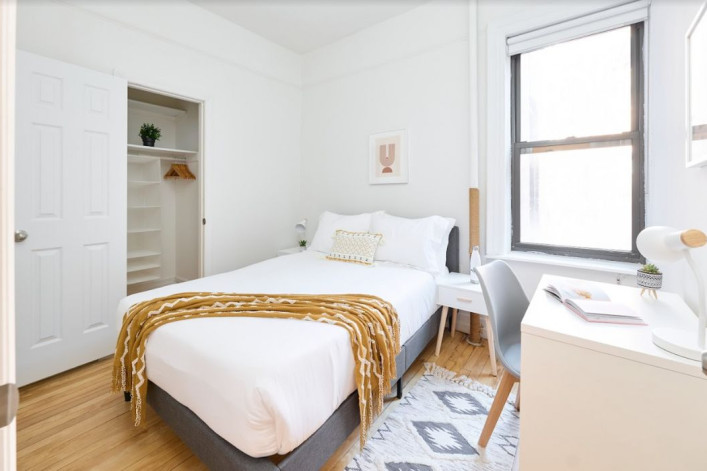A guide to renting in NYC as a college or grad student
- A personal or third-party guarantor might be necessary to meet income requirements
- Some buildings offer the benefits of campus life with communal areas and social activities
- Not staying during the summer? Look for a short-term rental with flexible lease terms

Some buildings cater to students and are conveniently located near colleges, such as this unit on West 139th Street near Columbia University.
Courtesy of Student.com
If you attend one of the many colleges or universities in New York City and plan to live off-campus this year rather than in a dorm, there are a few things you need to know about apartment hunting in the current rental market.
For starters, it's red hot. When Scotty Eyanow, a broker at Compass, was recently showing apartments near NYU, he says there were 30 groups of roommates looking at the same apartment. "It was an incredible amount of traffic," he says. And it's not just other students you are competing with but renters of all ages and income brackets.
Sure enough, Jacqueline Kurtz, an agent at Coldwell Banker Warburg, says some buildings that are close to campuses tend to get a lot of students. "Since students usually don’t have income yet, they will be open to guarantors. As well, the buildings might be more open to sharing and also have common areas that tenants can hang out in—lounges, fitness centers, and outdoor terraces."
Still, it can be tricky to find an apartment as a student because landlords typically want tenants who earn an annual salary of at least 40 times the monthly rent. That's even true for buildings that specifically cater to students (and interns)—and even if you have a hefty savings account. When you don't meet these requirements—and few students do—you typically need a guarantor. This is someone who promises to pay your rent if you don't.
[An earlier version of this article was published in May 2021 and has been updated with new information for April 2023.]
Eyanow's advice is to get all your paperwork prepared and be ready to act quickly. You also need to do your research: Some buildings actively court students but others don't or won't allow out-of-state guarantors. Ask your agent about all these issues up front and find out exactly what is needed to land the apartment.
These and other tips are unpacked below to help you find a temporary home away from home.
Line up a guarantor
Often enough, the only way students can rent in NYC is by having a guarantor—usually a parent or guardian—who agrees to be legally responsible for the rent in case you default. Just as landlords have income requirements for tenants, they also have requirements for guarantors, and they are steep: A guarantor must typically earn 80 times the monthly rent because they need the ability to cover their own housing expenses as well as yours. That means for an apartment with a monthly rent of $4,000, a guarantor must earn $320,000.
Your guarantor needs to be prepared to supply plenty of paperwork as part of the application, including proof of employment, a CPA letter if they are self-employed, their most recent tax returns (usually the past two years) as well as an asset statement, which shows funds in a checking or savings account. There's also the standard credit check.
If you don't have a relative who can step in as a guarantor there are workarounds. You can use an institutional guarantor like Insurent, which has lower annual income requirements. Jeffrey Geller is the company's founder and says their program is accepted in around 9,000 participating buildings representing over 725,000 rental units. "Insurent normally prequalifies renters 24/7 within one hour, and issues the guaranty within 24 hours," he says.
That said, if you are an international student who will be looking for a new place in the fall, you should try to secure qualified by an institutional guarantor as soon as possible, according to Insurent CEO Charles Schoenau, who also advises students to start thinking in the spring about where you'll be living in the fall. As he shared with Brick, if you know you need a guarantor, get fully qualified before you even start to look. You're wasting your time looking around without one, he says.
For U.S. students and international students with U.S. credit, the cost is from 75 to 90 percent of one month's gross rent for a 12- to 15-month lease. For international students without U.S. credit, the cost is 98.4 percent of one month's gross rent for a 12- to 15-month lease.
With Blueground, you’ll shave weeks off finding and furnishing your new home. From studios to two-bedroom spaces, each of our turnkey apartments is thoughtfully designed and fully equipped from top to bottom. We provide a hassle-free experience and the flexibility to stay as long as you want — 30 days, a year, or longer. During your stay? You’ll enjoy reliable support through our app, where you can request everything from a home cleaning to extra towels. Check out over 500 unique apartments in Williamsburg, Midtown, and other top NYC areas and compare prices here.
Beware of net effective vs. gross rent
A landlord typically wants a lease to end between June and August, as summer is the easiest time to fill apartments. Eyanow says right now some landlords might ask for 14-month leases and give two free months but ask you to pay the net effective rent instead—which means the two-month discount is divided up and applied to your monthly rent.
If you are paying a net effective rent, it's important to know what your gross rent is, meaning what your rent would be without a discount, because when it comes to renew, any rent increase will be based on the gross rent, not the net effective.
"It’s a little bit of a strategy there," Eyanow says. For example, if you're being asked to pay $3,500 net effective for 14 months, your actual or gross rent is $4,080.
You can easily figure out your gross rent using Brick Underground’s Gross Rent Calculator.

Brick Underground's
Gross Rent Calculator
What's this?
Some New York City landlords offer a free month (or more) at the beginning or end of a lease. The advertised rent is the net effective rent. The net effective rent is less than the amount you will actually have to pay --- known as your gross rent --- during your non-free months.
Brick Underground's Gross Rent Calculator enables you to easily calculate your gross rent, make quick apples-to-apples comparisons between apartments and avoid expensive surprises. All you'll need to figure out your gross rent is 1) the net effective rent, 2) the length of your lease, and 3) how many free months your landlord is offering. [Hint: Bookmark this page for easy reference!]
To learn more about net effective versus gross rents, read What does 'net effective rent' mean?.
If the landlord is offering partial months free, enter it with a decimal point. For example, 6 weeks free rent should be entered as 1.5 months.
Split the costs with a roommate
You'd be hard-pressed to find anyone under 30 (and even over!) who has managed to live solo entirely in NYC. Pooling funds is often the only way to afford the steep rents.
And there are plenty of websites and apps connect you with your potential roomies. They'll help make a match with another student who has similar interests and preferences (like whether it's ok or not to let dirty dish pile up).
If shacking up with someone your age doesn't thrill you, or you like being able to do a good deed while saving money on housing expenses, consider home sharing with a senior through the New York Foundation for Senior Citizens, which allows one of the participants to be 18 or above so long as the other is at least 60 years of age. (You'll make your grandparents proud.)
When it comes to making a good match, you’ll want to check out Brick Underground’s 21 best questions to ask potential roommates. And don’t forget the roommate contract—which is a good way to avoid conflicts big and small.
Need help finding the perfect starter apartment in the right neighborhood—or a landlord inclined to be flexible about guarantors, work history, rental history, or "flexing" your space with temporary walls? Place your search into the capable hands of The Agency, a tech-savvy real estate brokerage that's helped hundreds of Brick Underground readers find their ideal NYC apartments. Bonus: The agents at The Agency are not only a delight to deal with, they will charge a broker's fee of 10 percent of a year's rent on open listings instead of the usual 12 to 15 percent if you sign up here.
Take over a lease
Another route for finding off-campus housing is to consider taking over someone else's lease. If you find someone who wants to move out of their place and you're happy to take their spot, you'll still need to be approved by the landlord, which means meeting those pesky financial requirements. Leasebreak is one trusted resource for not only leasebreaks but also shorter leases, sublets, and shared apartments across NYC.
Alex Caballero, an agent at NY Living Solutions, says leasebreaks are happening more than ever as New Yorkers are relocating to other cities or realizing they can save money by working from home and living outside the city.
If you take this path, you should know the difference between a sublet and a lease assignment. With a sublet, the original tenant stays on the lease and there's the assumption they will return at some point. With a lease assignment, the original tenant moves on and you take on the lease. For more on this, read, "Renters beware: 14 things to look out for in that lease" and "How to break a lease in NYC."
Look for short-term rentals
It is possible to sign a lease for a term shorter than a year. So if you don’t need to be in the city through the summer, a landlord might agree to a shorter lease (say, nine months) that can then be turned over in late spring, the prime rental season.
Your best bet is to hire a licensed real estate agent who specializes in short-term rentals or use a reputable short-term rental agency or listing site. These places don't have the 40 times rent income requirement and have flexible lease terms (but are still beholden to the 30-day-minimum rule). Rents are typically more expensive, but if you can cover the rent without having to show deep pockets, this might be a good workaround.
Just beware of short-term rental scams and know that co-op buildings have restrictions on subletting and condos can require minimum and maximum lease terms.
Explore student-friendly buildings
Li Chuang, an agent at Compass, says buildings that forgo share restrictions and those that allow guarantors for larger two and three-bedroom apartments are actively catering to students, recent grads, or other groups that have starter apartment criteria.
"Institutional landlords or landlords who don't live or directly manage their buildings are likely to be less interested in maintenance and more interested in capitalizing on the steady stream of student housing demand, especially as tuition continues to skyrocket," Chuang says.
Places like Educational Housing Services and Student.com specialize in buildings that cater to college students. EHS has four student-only buildings across NYC, two of which are summer only but the other two—St. George in Brooklyn Heights and The New Yorker in Midtown—have year-round rentals and come with a communal kitchen, study room, screening room, pool table, flat screen TVs and access to fitness clubs.
Student.com lets you search for rooms by university and to restrict the results to student-only buildings (though your options will be cut by half) as well as by price and room type; you can also tick the boxes for "no visa, no pay" or "no place, no pay" cancellation options in case you fail to secure a visa or get accepted into the college. EHS accepts guarantors but Student.com requires full payment upfront.
There are also co-living operations that welcome students (and young professionals) such as Harrington Housing (with multiple locations), The Alabama (near NYU), and
Search for a no-fee apartment
Whatever route you take to finding an apartment, one big way to save is by avoiding the broker fee. In the New York City rental market, brokers who are hired to represent the landlord's interests get paid by the renter—it sounds absurd and has been part of various legal disputes—but the fee can be one month's rent or up to 15 percent of the year's total rent.
And if you want to avoid that scenario, limit your search to no-fee apartments—and there are even buildings like Silver Towers (Times Square) and StuyTown (East Village) that proudly tout their no-fee status.
Rethink the value of living on campus
As Gerard Splendore, a broker at Coldwell Banker Warburg, sums up the situation: "Of course, students are a protected category and cannot be denied access to rentals if they are financially qualified," but because renters who share an apartment are supposed to be on the same lease "it can be a complicated process." Some use parents as guarantors who are "out of state, divorced, and not living together, again complicating leases and paperwork." You practically need a PhD in real estate to navigate the quagmire.
So who can blame you if you wave the white flag in surrender and decide to make a go of dorm life. Besides saving your sanity, it could save you serious money over renting off campus. And why not try and become a resident advisor and get some or all of the cost of your room and board subsidized in return for being on duty? That way you are building your resume along with your bank account.
You Might Also Like





























